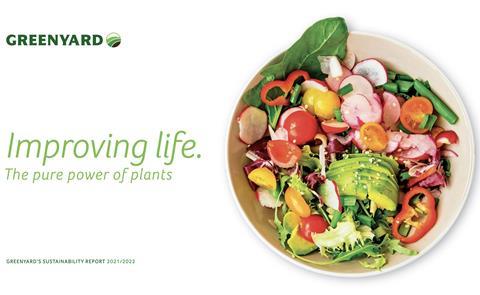Group reports on a year that saw progress along the company’s Sustainability Roadmap 2025
Greenyard has released its fifth sustainability report, covering a year that was marked by important progress on the company’s Sustainability Roadmap 2025 and the roll-out of an extended sustainability database to measure efforts across the group.

”Sustainability is deeply embedded in Greenyard’s day-to-day operations and its unique fork-to-field approach,” the group explained. “Building on this strong and natural basis, important steps were taken to create a fact-based fundament for its range of sustainability efforts.”
These include the recent launch of a new KPI management system to monitor its key sustainability indicators and follow up on its progress, and the realisation of a double materiality assessment earlier this year.
According to Greenyard, these steps were necessary as they directed the company to further progress on the right path of sustainable food value chains, while also providing tangible insights during that progress.
“Even though fruit and vegetables have a relatively small footprint, we also embrace our own responsibility as a leading, global player,” said Florens Slob, group sustainability and innovation director.
”This year was also marked by several initiatives directly contributing to the targets set in our sustainability roadmap, which we launched last year,” Slob explained. ”Our Scope 1 and 2 emissions for instance, which decreased by 4.5 per cent on a like-for-like basis this year.”
Other sustainability highlights of last year included moving towards a full electric car policy in its core markets, introducing an internal carbon price of €100 per tonne CO2 which its entities can include in their business cases to promote their sustainable choices, and conducting a quantitative scenario-analysis trial on the grape supply chain.
”Nature is the starting point of the entire food value chain,” said Hein Deprez, co-CEO Greenyard. “We cannot do without it and, we need to nourish it.
”It is deeply embedded in our company’s strategy. Therefore, even in the highly complex context of the past year, Greenyard further accelerated on its Sustainability Roadmap 2025.
“We are convinced that our sustainability initiatives go hand in hand with economic benefits,” he outlined. “This is logical, as we reduce waste, and save costs through for instance the optimisation of transport, reduction of water usage and so on. Sustainability brings both ecological and economical value, for Greenyard and for our customers.”
Marc Zwaaneveld, co-CEO Greenyard, said that sustainability was ”fundamental” to the future growth of the company.
“It creates value throughout the entire food value chain,” hhe said. ”Obviously, this is a shared responsibility. An effort all stakeholders must tackle together, from growers and suppliers to customers and to consumers.
“With Greenyard, we are uniquely positioned to be the connecting partner in this journey,” he added. “Our close and integrated collaborations with retailers and growers enable us to match demand and supply in an unparalleled and extremely advanced way, while ensuring fair value for all.”



